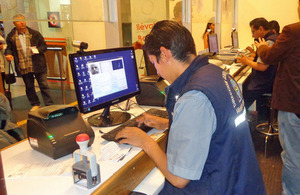Immigration control at Bolivian airports improved with UK support
The British Embassy in La Paz donated equipment to support the implementation of a new Immigration Control System in Bolivia.

Equipment for data capture and storage at La Paz International Airport
This equipment was delivered to the Directorate General of Migration, which later developed the SISCO computer system to capture and process data. After several adjustments, updating, pilot testing and training of Migration staff at the airports, the system was introduced in the second half of 2012 in La Paz, Cochabamba and Santa Cruz airports.
The system allows straightforward validation of ID documents through a scanning process that complements the mechanical reading of passports and identity cards. Therefore, it is now possible to spot identity theft cases and exert better control over the departure of minors, thus contributing to the prevention of human trafficking.
Through this project, the British Government has shown its commitment to the shared responsibility to combat organized crime and the fight against drug trafficking. We work closely with the Bolivian government on issues of illicit drug trafficking and related crimes, under the Memorandum of Understanding between Bolivia and the United Kingdom.
This Memorandum was signed during the official visit of Foreign Minister David Choquehuanca to the UK in 2011, and aims at strengthening cooperation and coordination between the two governments to take action against transnational organised crime groups.
An example of this collaboration was the donation in 2009 of the first forensic laboratory in Bolivia specialising in counternarcotics with the provision of advanced technology for chemical profiling of seized drugs. This lab is a significant support to the work of the Special Antinarcotics Force in Bolivia.
Updates to this page
-
Added translation
-
First published.